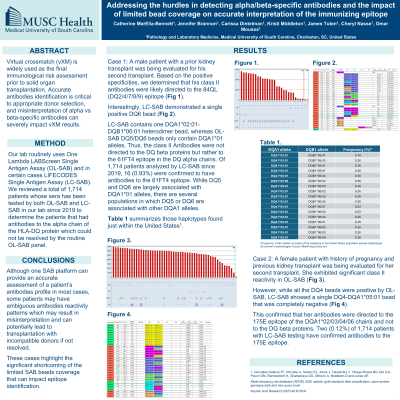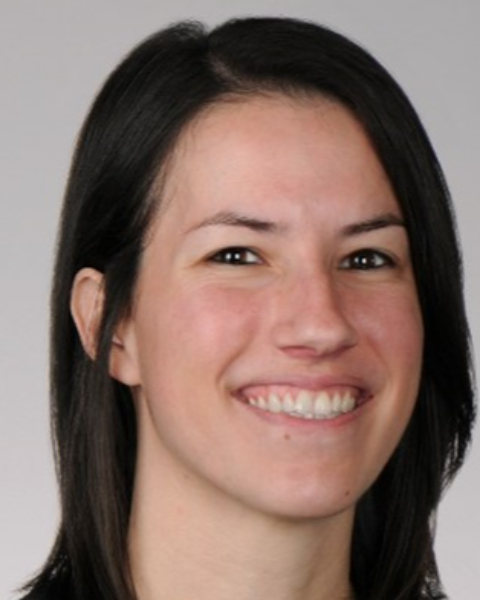(P616) Addressing the hurdles in detecting alpha/beta-specific antibodies and the impact of limited bead coverage on accurate interpretation of the immunizing epitope
Location: Platinum Ballroom

Poster Presenter(s)
Body: Virtual crossmatch (vXM) is widely used as the final immunological risk assessment prior to solid organ transplantation. Accurate antibodies (Abs) identification is critical to appropriate donor selection, and misinterpretation of alpha vs beta-specific Abs can severely impact vXM results. Our lab routinely uses One LambdaTM LABScreen Single Antigen Assay (OL-SAB) and in certain cases LIFECODES® Single Antigen Assay (LC-SAB).
Case 1: A male patient with a prior kidney transplant was being evaluated for his second transplant. Based on the positive specificities, we determined that his class II Abs were likely directed to the 84QL (DQ2/4/7/8/9) epitope (Fig 1). Interestingly, LC-SAB demonstrated a single positive DQ6 bead (Fig 2). LC-SAB contains one DQA1*02:01- DQB1*06:01 heterodimer bead, whereas OL-SAB DQ5/DQ6 beads only contain DQA1*01 alleles. Thus, the class II Abs were not directed to the DQ beta proteins but rather to the 61FT4 epitope in the DQ alpha chains. Of 1,714 patients analyzed by LC-SAB since 2019, 16 (0.93%) were confirmed to have Abs to the 61FT4 epitope. While DQ5 and DQ6 are largely associated with DQA1*01 alleles, there are several populations in which DQ5 or DQ6 are associated with other DQA1 alleles. Table 1 summarizes those haplotypes found just within the United States.
Case 2: A female patient with history of pregnancy and previous kidney transplant was being evaluated for her second transplant. She exhibited significant class II reactivity in OL-SAB (Fig 3). However, while all the DQ4 beads were positive by OL-SAB, LC-SAB showed a single DQ4-DQA1*05:01 bead that was completely negative (Fig 4). This confirmed that her Abs were directed to the 175E epitope of the DQA1*02/03/04/06 chains and not to the DQ beta proteins. Two (0.12%) of 1,714 patients with LC-SAB testing have confirmed Abs to the 175E epitope.
Conclusion: Although one SAB testing platform can provide an accurate assessment of a patient’s Abs profile in most cases, some patients may have ambiguous Abs patterns which may result in misinterpretation of the Abs and can potentially lead to transplantation with incompatible donors if not resolved. These cases highlight the significant shortcoming of the limited SAB beads coverage that can impact epitope identification.
Case 1: A male patient with a prior kidney transplant was being evaluated for his second transplant. Based on the positive specificities, we determined that his class II Abs were likely directed to the 84QL (DQ2/4/7/8/9) epitope (Fig 1). Interestingly, LC-SAB demonstrated a single positive DQ6 bead (Fig 2). LC-SAB contains one DQA1*02:01- DQB1*06:01 heterodimer bead, whereas OL-SAB DQ5/DQ6 beads only contain DQA1*01 alleles. Thus, the class II Abs were not directed to the DQ beta proteins but rather to the 61FT4 epitope in the DQ alpha chains. Of 1,714 patients analyzed by LC-SAB since 2019, 16 (0.93%) were confirmed to have Abs to the 61FT4 epitope. While DQ5 and DQ6 are largely associated with DQA1*01 alleles, there are several populations in which DQ5 or DQ6 are associated with other DQA1 alleles. Table 1 summarizes those haplotypes found just within the United States.
Case 2: A female patient with history of pregnancy and previous kidney transplant was being evaluated for her second transplant. She exhibited significant class II reactivity in OL-SAB (Fig 3). However, while all the DQ4 beads were positive by OL-SAB, LC-SAB showed a single DQ4-DQA1*05:01 bead that was completely negative (Fig 4). This confirmed that her Abs were directed to the 175E epitope of the DQA1*02/03/04/06 chains and not to the DQ beta proteins. Two (0.12%) of 1,714 patients with LC-SAB testing have confirmed Abs to the 175E epitope.
Conclusion: Although one SAB testing platform can provide an accurate assessment of a patient’s Abs profile in most cases, some patients may have ambiguous Abs patterns which may result in misinterpretation of the Abs and can potentially lead to transplantation with incompatible donors if not resolved. These cases highlight the significant shortcoming of the limited SAB beads coverage that can impact epitope identification.

